- Home
- David Leavitt
The Two Hotel Francforts Page 2
The Two Hotel Francforts Read online
Page 2
“I can’t see why not,” Edward said. He took my arm, as if I really was a blind man. “Now, I don’t know how familiar you are with the city—”
“Not very.”
“Then I’ll play tour guide for a bit. The neighborhood we’re in is Baixa. The neighborhood in the hills ahead of us is the Bairro Alto. The neighborhood in the hills behind us is the Alfama. That’s where the castle is. White peacocks roam the grounds. Now we’re crossing the Rossio. The Rossio isn’t its official name, of course. Its official name is Praça Dom something-or-other. That big statue way up there on the pedestal, that’s Dom something-or-other himself. Oh, and here’s an interesting bit of local color. Can you make out the paving stones? They’re laid in a pattern of waves. The effect is supposed to be nautical, suggesting Portugal’s dominion over the seas. Well, in the last century, when the English expats colonized Lisbon, they called the Rossio ‘Rolling Motion Square,’ because when they crossed it after a night of drinking they got seasick. Careful!”
I had nearly fallen; would have fallen if he hadn’t caught me.
“You seem to know the city so well,” I said. “Have you been here before?”
“My first time. I got in seventy-two hours ago. Which makes me an old Lisbon hand.”
“An older hand than I am after a week.” Again I tripped, landing against his side.
“You can’t see anything, can you?”
“Oh, I can see the outlines of things. Colors, shapes. Over there’s a big yellow worm. And next to it’s a bouncing ball. And tops spinning.”
“The worm is a tram. The ball is a dog. The tops are children.” He tightened his grip on my arm. “Now that I think about it, I wonder if it wouldn’t be in my best interest to make sure you don’t get your other glasses.”
“Why’s that?”
“Because without them, you’re my prisoner. You’re completely in my power.”
He punched me lightly on the biceps. I laughed. I couldn’t help it.
“What’s so funny?”
“I don’t know … I suppose it’s just how strange the world looks.”
“And how does it look?”
“As if a wind’s blowing everything. Even the solid things. The writing on the signs—it’s like skywriting that’s starting to break apart.”
“And me? How do I look?”
“Oh, you I can see just fine. I’m nearsighted, not farsighted.”
“Yes, but how?”
Suddenly he stopped me in my tracks. He took me by the chin and turned me to face him. Close up, his features came into a focus that was all the sharper for the vagueness of the background. A zigzag scar ran the length of his chin. The nose flared, the small green eyes blinked once … twice …
“You look,” I said, “—well, fine.”
Apparently this answer was more droll than I had intended, for he laughed and patted me on the back. We resumed our walk. “A curious word, ‘nearsighted,’” he said. “I mean, to say someone’s nearsighted—isn’t it like saying of an armless man that he has two legs? Or to call someone who doesn’t eat fish a meat eater? Why, if we talked that way all the time, how would we ever say anything to each other, any of us? But we do talk that way all the time.”
I had no idea how to reply to this—which, I suppose, was illustrative of his point—so I said nothing. We had now reached the opposite side of the Rossio, the one on which the swankier cafés—the Brasiliera, the Chave d’Ouro, the Nicola—were situated. Edward still had his hand on my arm. He was not so much leading me as pulling me, the way one might a dog on a leash. Not that I minded. Indeed, it was a pleasure, after so many weeks shouldering the burden of Julia, to be able to lean on someone else’s shoulder. And Edward’s shoulder was—how to put it?—reliable. In part this was because he was tall. I am five foot eight—seven inches taller than my wife, but seven inches shorter than Edward, whose stature was particularly noteworthy in Portugal, where few of the men exceed five-five or five-six. Yet there was more to it than just that. He had the quality that certain dogs do, of seeming always to have a destination in mind, even when they don’t.
He asked me what I did for a living and I told him. (I worked for General Motors then. I managed the Buick sales division in France—or did, until the Germans came.)
“So you’re gainfully employed,” he said. “That’s refreshing. I can’t remember the last time I met someone who was gainfully employed, other than waiters and hotel managers. Needless to say, I’m not gainfully employed.”
“No?”
He shook his head. “I’ve never had a job in my life. Wait, that’s not true. The summer I turned sixteen, I worked in a shop. I sold yerba del sol tea, homemade preserves, and books on occultism. I never got paid, though. They still owe me seven dollars.”
“Where was this?”
“In California, in the Theosophist community where my mother lives. Or perhaps I should say the Theosophy community that lives on my mother.”
I didn’t know what Theosophy was. “And where will you go once you’re back in the States?”
“Oh, New York. I mean, where else is there?”
“Are you from New York?”
“I’ve lived in New York. I’m not really from anywhere. My father was Hungarian, but by the time I was born, he’d long since left Hungary. As for my mother—well, technically she’s Polish, though she grew up in England. Which meant that they could only ever communicate in second languages. And given that my mother speaks excellent English but not very good French, and that my father spoke excellent French but not very good English—well, is it any wonder that until I was five I didn’t utter a word?”
“But your English is perfect.”
“That was luck. I had a great-aunt who lived in New York. She took me under her wing. Thanks to her, I got an education.”
“Where?”
“Harvard, then Heidelberg—briefly—then Cambridge for the Ph.D.—the one I never finished. That was where I met Iris—at Cambridge. What about you?”
“Oh, just a little college in Indiana. Wabash College. You’ve probably never heard of it.”
“I have, actually. I just can’t put my finger on where.”
We were now approaching the Francfort—our Francfort. I’m told the hotel closed a few years ago. It was on Rua Santa Justa, at the foot of the famous Santa Justa Elevator, from the turreted roof of which you could get a splendid view of the city, the docks, the distant hills in the shadows of which, on clear nights, Estoril and Sintra glinted. The Francfort had a revolving door. I have always loved revolving doors, the mirror and whirl of them, how, when you pass through one, for a brief moment you’re sealed in, coffined, a hostage in a wedge of glass … And now I was in one compartment of the revolving door and Edward was in the one behind it, pressing me forward at such a speed that I tumbled out the other side as if I were drunk … About the lobby’s tiled floor, islets of furniture were dispersed, each with its own reef of rug. The curtains were drawn against the sun. In the artificial gloom, women’s earrings winked like coins; the pinpoint gleam of cigarettes might have been torchlight.
“Look at this!” Edward said. “A proper hotel lobby! Our Francfort doesn’t have a lobby, only a mean little reception. Oh, and you’ve got a winter garden, too.”
“Not much use in the summer, a winter garden,” I said, as if it were something to be ashamed of. “Well, thanks for getting me back in one piece. I think I can manage from here.”
“Nonsense, I’m not having you break your neck going down a dark corridor. Wait a second.”
Then he strode off to the front desk, where for about five minutes he chatted with Senhor Costa, the hotel manager, in a French too idiomatic and swift for me to follow. For though I had lived in France for fifteen years, working for an American company as I did, I had never really mastered the language. Neither had Julia. This was for both of us a source of embarrassment.
When he returned, he held the key to our room. “Sorry about that.
I was just asking him to take my name in case a room happened to open up … Oh, a lift! What we wouldn’t give for a lift, especially now that we’re on the top floor.”
“Yes, but it’s a very old lift,” I said as we stepped inside. “It breaks down all the time.”
“Shh.” Edward touched a finger to his lips. “You mustn’t say things like that or they’ll hear you.” At which the lift, as if to prove his point, shuddered and heaved, lurched upward, trod air, as it were, for a few long seconds before hauling itself, with a great groan of effort, to the second-floor landing. “See what I mean? It’s the same with cars. You mustn’t praise them or they’ll break down. Of course, being in the car business, you must know that.”
“I don’t make a habit of talking to my cars.”
“Wise of you. Their conversation isn’t much.”
Again he took my arm. Down the corridor he led me—he and Messalina nodded to each other like old acquaintances—to my door, into which he fitted the key as if it were his own. Sunlight spilled through the cleft. “I say, this is nice,” he said, taking in our little room with its narrow bedstead, its intricate tiled floor, its single chair over the back of which Julia had flung one of her slips. Pots and jars, the unguents and emollients on which my wife relied to maintain her youth, lay scattered over the surface of the vanity. “Oh, and don’t tell me you’ve got a bathroom!”
“I’m afraid we have, yes.”
“Don’t be afraid, be glad. May I?” He nudged open the door. Underwear hung drying from a cord that Julia had rigged up over the tub.
“I’m sorry things are in such a state,” I said. But Edward wasn’t listening. First he tried the cold tap, then the hot tap. Then he lifted the plug from the drain. Then he touched his fingers to one of the pairs of Julia’s panties.
“Silk,” he said, caressing the material. “With handmade lace. Very nice.”
I was flabbergasted. Was this a compliment? And if so, who was being complimented?
“Julia has always been very particular about her things,” I said.
“She has a tiny waist,” he said, reaching his hand through one of the leg holes. “Iris’s figure is more zaftig. Rubenesque—if Rubens had ever painted Scottish lasses. Of course, she’d never wear this kind of thing. She only ever wears plain white cotton knickers. Schoolgirl knickers.” He smiled at me. “Do you like that sort of thing? You know, a grown woman in little girl’s pants?”
“I don’t know. I haven’t really thought about it.”
“Oh, come on. You must have thought about it.” He stepped closer. “Schoolgirl knickers on a woman with curves. The effect can be quite eye-catching.”
“Excuse me.” I left the bathroom and walked to the window, which I opened.
“Are you all right?”
“Fine. I just needed some air.”
Now he was standing behind me, his hands on my shoulders. “Ah, that’s a good smell. A real Lisbon smell. Linens drying, fish guts, coal smoke … And what’s that? Listen.”
Aside from the wail of a shutter that had come unmoored, the only sound was a pianist—a child, I guessed—practicing a Brahms intermezzo.
“Oh, him,” I said. “He’s been playing that same piece since we got here, only he can’t seem to get past this one chord. Just a sec, here it comes.” And indeed the pianist, having made it through the first few bars, reached the troublesome chord; flubbed it; started again. “Every day it’s the same. It gets rather maddening after a while.”
“At least it’s not traffic. Our room overlooks an outdoor market. If we close the window, we suffocate from the heat. But if we open it, we can’t sleep for the noise. Which is to say nothing of the stench.”
“Odd thing, the two hotels having the same name.”
“Isn’t it? I asked around about that. The story is, they used to have the same owner. And when he died, he left one hotel to one son and the other to the other, but the brothers got rivalrous and tried to outdo each other in renovations, until finally they both went bankrupt and had to sell. And though it’s been years since the hotels have had any affiliation, the quarrel lives on, as if of its own volition. The problem is, no one outside of Lisbon realizes that there are actually two Hotel Francforts—or should that be Hotels Francfort?”
“I’m not sure.”
“Let’s say Hotel Francforts. And since no one outside of Lisbon realizes there are two, half the time letters addressed to guests at the one arrive at the other, where, as often as not, they’re thrown into the trash.”
“Really?”
“I’ve seen it happen. It’s a disaster for the refugees, who are always waiting for something vital to come in the mail. May I?” He pulled the chair out from under the vanity and sat. I turned toward him. His legs were spread just wide enough that his trousers bunched at the crotch.
“Sit down,” he said.
There was nowhere to sit but on the bed, so I sat on the bed. He put his hands behind his head, in the process sliding down in his chair a little. Now his legs, crossed at the ankles, stretched to the point where our shoes—the tips of our shoes—touched.
“Pete,” he said. “May I ask you a question?”
“Of course.”
“Did I offend you earlier, talking about your wife’s underwear like that?”
“Offend me? No.”
“Still, I shocked you.” He drew in his knees and leaned forward. “You really must forgive me. Years of hotel life have made me uncouth.”
“I thought you had a house.”
“We do—now. Before, though, during the years of pilgrimage, as I call them, we lived in hotels. Dozens of them. And every night, after dinner, the ladies would repair to the lounge. And every night, after dinner, the gentlemen would repair to the smoking room, for cigars and dirty stories. Continental resorts are old-fashioned in that way. Of course, you’re innocent of all that.” He nudged my shoe with his.
“No, I’m not.”
“It’s okay. I find it refreshing.”
“But I’m not innocent. How could I be? All my life I’ve worked in auto showrooms. Car salesmen aren’t exactly shrinking violets. You hear a lot of racy stories.”
“Really? Tell me one.”
“I can’t think of any just now.”
“All right, then. Sell me a car. I’d love to buy a car from you.”
“I can sell you my car. She’s a beaut—a 1939 Buick Limited six-passenger Touring Sedan, hardly ever driven, with just the miles between Paris and Lisbon on the odometer.”
“You drove to Lisbon? What was that like?”
“On the road to Bordeaux, the traffic went at a crawl. There were farmers with donkey carts, and peasants pushing their mothers in strollers, and horses loaded up with every imaginable sort of junk—chamber pots, milking stools, crates of chickens. And in the midst of it all, the Packards and the Hispano-Suizas, honking their horns to speed things up. And then every few hours a military convoy would show up, trying to go the opposite direction, toward Paris, but since the road had no shoulder, everything would just end up in a hopeless tangle … And I thought, France is doomed.”
“My God.”
“And Julia refused to go out into the fields. All the other women did, even the ones in limousines—they had no qualms about hitching up their furs and squatting. But not Julia.”
“We came by train,” Edward said. “On the Sud Express, we were stuck nine hours outside of Salamanca, with the lights out and the rain bucketing down. It rained all the way to the Portuguese frontier. The sun only came out when we crossed. I mean it came out literally as we were stepping across the frontier. How’s that for cheap symbolism?” Suddenly he snapped his fingers. “Now I remember where I’ve heard of Wabash. ‘The Wabash Cannonball.’ How does it go? Past the lakes of something-something, where the something-somethings fall …”
“No changes to be taken on the Wabash Cannonball.”
“A train, wasn’t it?”
“There are all sorts of
stories about it. For instance, that it had seven hundred cars. And the engine was so fast that you arrived before you left.”
“Funny you should say that,” he said, “because when I was a boy, whenever I’d go to visit my mother in California, I’d perform this funny sort of ritual. I’d walk the length of the train, front to back, going backward as the train went forward, to the caboose. And then in the other direction, to the engine. I had to do it. It was like not stepping on a crack … Well, I’d forgotten all about that until just a few days ago, on the Sud Express, I found myself doing the same thing. Only the train was moving so slowly that I could match my pace to its pace. I could walk backward at exactly the speed that it was going forward. So that in every one of the windows, the scene was the same. A muddy field, a goat … Now, if that train had had seven hundred cars …” He uncrossed his legs, then recrossed them in the other direction, in the process stretching them out a little. Now our feet scissored each other.
Neither of us moved. The loose shutter slapped its wall. The pianist hit the inevitable wrong chord.
“Oh, your glasses,” Edward said. “You still haven’t got your glasses.” But I had forgotten all about my glasses.
Chapter 3
It took me ten minutes to find the glasses. While Edward stood by, bemused, I rifled through our trunk, my suitcase, Julia’s suitcase, the gas-mask holder in which we kept our money and papers, before finally locating them in my Dopp kit: an old pair, tortoiseshell, the lenses a little scratched.
No sooner had I put them on than I was nauseated. “Are you okay?” Edward asked, holding out his hand to steady me.
Now his eyelashes were sharp as needles, his scar as raw as if it were fresh.
“I’m fine,” I said. “I just need to get my bearings. The prescription is a little weaker than on the other pair.”
“I’ve never worn glasses. May I try them?”
I handed them to him—and was relieved to see his body melting back into imprecision.

 Shelter in Place
Shelter in Place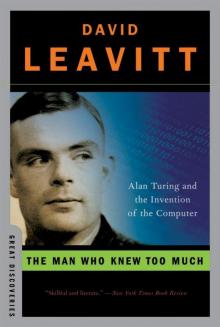 The Man Who Knew Too Much: Alan Turing and the Invention of the Computer (Great Discoveries)
The Man Who Knew Too Much: Alan Turing and the Invention of the Computer (Great Discoveries)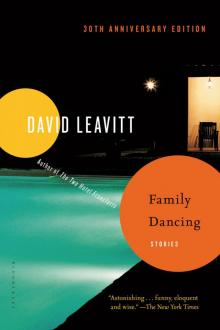 Family Dancing
Family Dancing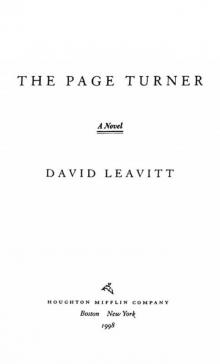 Page Turner Pa
Page Turner Pa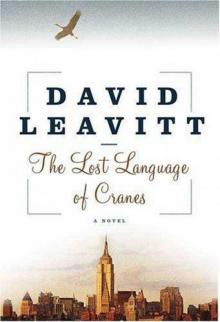 The Lost Language of Cranes: A Novel
The Lost Language of Cranes: A Novel The Body of Jonah Boyd
The Body of Jonah Boyd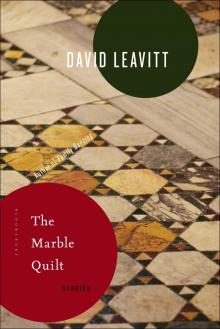 The Marble Quilt
The Marble Quilt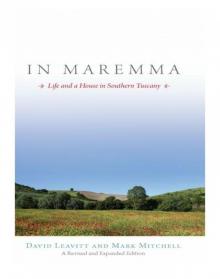 In Maremma
In Maremma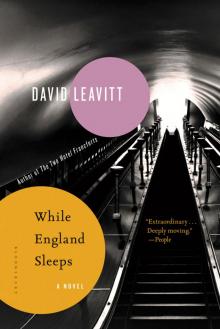 While England Sleeps
While England Sleeps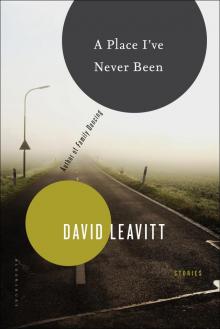 A Place I've Never Been
A Place I've Never Been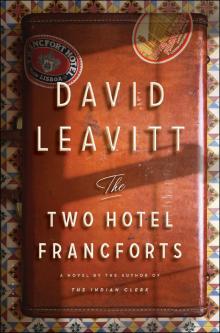 The Two Hotel Francforts
The Two Hotel Francforts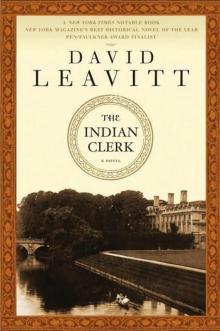 The Indian Clerk
The Indian Clerk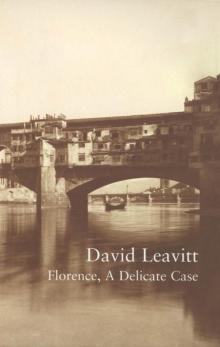 Florence
Florence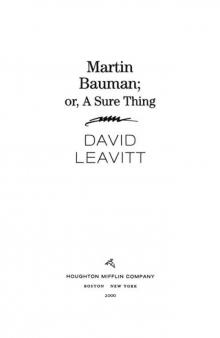 Martin Bauman
Martin Bauman Equal Affections
Equal Affections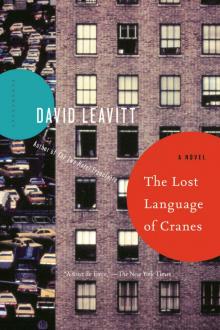 The Lost Language of Cranes
The Lost Language of Cranes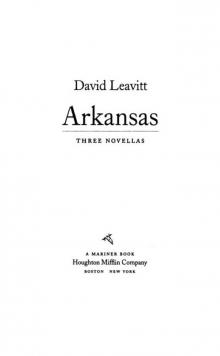 Arkansas
Arkansas